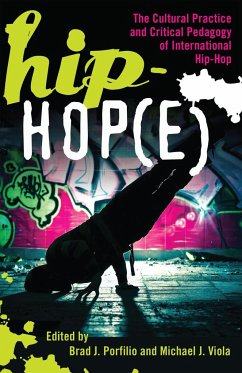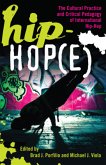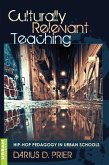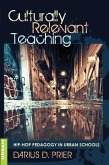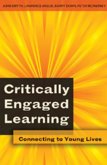This book won the 2014 AESA (American Educational Studies Association) Critics Choice Award.
Illuminating hip-hop as an important cultural practice and a global social movement, this collaborative project highlights the emancipatory messages and cultural work generated by the organic intellectuals of global hip-hop. Contributors describe the social realities - globalization, migration, poverty, criminalization, and racism - youth are resisting through what we recognize as a decolonial cultural politic. The book contributes to current scholarship in multicultural education, seeking to understand the vilification of youth (of color) for the social problems created by a global system that benefits a small minority. In an age of corporate globalization, Hip-Hop(e) highlights the importance of research projects that link the production of educational scholarship with the cultural activities, everyday practice, and social concerns of global youth in order to ameliorate social,economic, and political problems that transcend national boundaries.
Illuminating hip-hop as an important cultural practice and a global social movement, this collaborative project highlights the emancipatory messages and cultural work generated by the organic intellectuals of global hip-hop. Contributors describe the social realities - globalization, migration, poverty, criminalization, and racism - youth are resisting through what we recognize as a decolonial cultural politic. The book contributes to current scholarship in multicultural education, seeking to understand the vilification of youth (of color) for the social problems created by a global system that benefits a small minority. In an age of corporate globalization, Hip-Hop(e) highlights the importance of research projects that link the production of educational scholarship with the cultural activities, everyday practice, and social concerns of global youth in order to ameliorate social,economic, and political problems that transcend national boundaries.
«In a world in which cultural production and youth culture is becoming globalized and commodified, and in which the power of global capitalism seems insurmountable, this volume suggests there is reason to be hopeful that new forms of resistance and intellectual artistry are also developing that are counter-hegemonic.» (Dennis Carlson, Professor, Miami University, Ohio)
«'Hip-Hop(e)' emancipates critical pedagogy from the postmodernist trap that has long ensnared it within universities and helps us to understand hip hop as much more than a vehicle for capitalist clichés of materialism and individualism.» (Wayne Ross, Professor, University of British Columbia; Co-editor of 'Critical Theories, Radical Pedagogies, and Social Education ')
«[This] book contributes to the fields of hip-hop studies as well as critical pedagogy, merging research and activism and exploring hip-hop as a world view, aesthetic, politics, critical lens, and practice that can profoundly shape teaching and learning in informal and formal educational contexts.» (Bronwen Low, McGill University, Author of 'Slam School: Learning through Conflict in the Hip-hop and Spoken Word Classroom')
«This volume is an important new contribution to the literature on critical pedagogy, and to the re-invention and re-vitalization of critical pedagogy in new and unsettling times. The authors seek to move critical pedagogy beyond the American academy to a global stage, connect it to the lived experiences and political praxis of marginalized and oppressed youth, and demonstrate how it can be used to connect the local and the global in struggles for social justice. In a world in which cultural production and youth culture is becoming globalized and commodified, and in which the power of global capitalism seems insurmountable, this volume suggests there is reason to be hopeful that new forms of resistance and intellectual artistry are also developing that are counter-hegemonic. All of this raises profound questions about what it means today to educate for what Paulo Freire called 'conscientization.'» (Dennis Carlson, Professor, Miami University, Ohio)
«Hip-Hop(e) emancipates critical pedagogy from the postmodernist trap that has long ensnared it within universities and helps us to understand hip hop as much more than a vehicle for capitalist clichés of materialism and individualism. The editors and authors of Hip-Hop(e) illustrate how both of these cultural practices emerged from class struggle and have evolved as radical, transformative cultural forms essential in responding to questions of racialization, dispossession, imperialism, and subjugation.» (E. Wayne Ross, Professor, University of British Columbia; Co-editor of 'Critical Theories, Radical Pedagogies, and Social Education')
«This lively collection demonstrates hip-hop culture's range and reach, as it is mobilized and reinvented to suit the needs of different contexts and communities. Its contributors document and critically engage with hip-hop's transnational incarnations, from break-dance in the Philippines and popular education in Sweden to drag king shows in Atlanta, Georgia, in light of (and in resistance to) the politics of neoliberalism as well as processes of social marginalization. The book contributes to the fields of hip-hop studies as well as critical pedagogy, merging research and activism and exploring hip-hop as a world view, aesthetic, politics, critical lens, and practice that can profoundly shape teaching and learning in informal and formal educational contexts.» (Bronwen Low, McGill University, Author of 'Slam School: Learning through Conflict in the Hip-hop and Spoken Word Classroom')
«'Hip-Hop(e)' emancipates critical pedagogy from the postmodernist trap that has long ensnared it within universities and helps us to understand hip hop as much more than a vehicle for capitalist clichés of materialism and individualism.» (Wayne Ross, Professor, University of British Columbia; Co-editor of 'Critical Theories, Radical Pedagogies, and Social Education ')
«[This] book contributes to the fields of hip-hop studies as well as critical pedagogy, merging research and activism and exploring hip-hop as a world view, aesthetic, politics, critical lens, and practice that can profoundly shape teaching and learning in informal and formal educational contexts.» (Bronwen Low, McGill University, Author of 'Slam School: Learning through Conflict in the Hip-hop and Spoken Word Classroom')
«This volume is an important new contribution to the literature on critical pedagogy, and to the re-invention and re-vitalization of critical pedagogy in new and unsettling times. The authors seek to move critical pedagogy beyond the American academy to a global stage, connect it to the lived experiences and political praxis of marginalized and oppressed youth, and demonstrate how it can be used to connect the local and the global in struggles for social justice. In a world in which cultural production and youth culture is becoming globalized and commodified, and in which the power of global capitalism seems insurmountable, this volume suggests there is reason to be hopeful that new forms of resistance and intellectual artistry are also developing that are counter-hegemonic. All of this raises profound questions about what it means today to educate for what Paulo Freire called 'conscientization.'» (Dennis Carlson, Professor, Miami University, Ohio)
«Hip-Hop(e) emancipates critical pedagogy from the postmodernist trap that has long ensnared it within universities and helps us to understand hip hop as much more than a vehicle for capitalist clichés of materialism and individualism. The editors and authors of Hip-Hop(e) illustrate how both of these cultural practices emerged from class struggle and have evolved as radical, transformative cultural forms essential in responding to questions of racialization, dispossession, imperialism, and subjugation.» (E. Wayne Ross, Professor, University of British Columbia; Co-editor of 'Critical Theories, Radical Pedagogies, and Social Education')
«This lively collection demonstrates hip-hop culture's range and reach, as it is mobilized and reinvented to suit the needs of different contexts and communities. Its contributors document and critically engage with hip-hop's transnational incarnations, from break-dance in the Philippines and popular education in Sweden to drag king shows in Atlanta, Georgia, in light of (and in resistance to) the politics of neoliberalism as well as processes of social marginalization. The book contributes to the fields of hip-hop studies as well as critical pedagogy, merging research and activism and exploring hip-hop as a world view, aesthetic, politics, critical lens, and practice that can profoundly shape teaching and learning in informal and formal educational contexts.» (Bronwen Low, McGill University, Author of 'Slam School: Learning through Conflict in the Hip-hop and Spoken Word Classroom')

